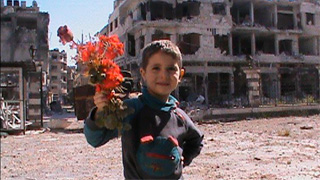Silvered Water, Syria Self-Portrait
 SYRIA, FRANCE / 2014 / Arabic / Color / DCP / 92 min
SYRIA, FRANCE / 2014 / Arabic / Color / DCP / 92 min
Directors, Script: Ossama Mohammed, Wiam Simav Bedirxan
Photography: Wiam Simav Bedirxan, thousand Syrians and Ossama Mohammed
Editing: Maïsoun Asaad
Additional Editing: Dani Abo Louh, Léa Masson
Music: Noma Omran
Sound Editor: Raphaël Girardot
Sound Mixing: Jean-Marc Schick
Production Companies: Les Films d’ici, Proaction Film
World Sales: Doc and Film International www.docandfilm.com
A Syrian filmmaker living in exile in France is suffering from estrangement and helplessness, knowing that the people of his homeland are in a merciless situation. With shocking images of atrocious acts of torture and slaughter from the raging frontlines uploaded on YouTube every day, he can do nothing but edit. On the internet, he meets a female Kurdish filmmaker living in Homs. She asks him, “What would you film if you were here with your camera?” At that moment, their film begins. The female filmmaker serves as the exiled director’s eyes and ears as she shoots on his behalf. This is the story of a collaboration pledged in the name of cinema.
[Director’s Statement] I was convinced that I had to do this film. I actually felt “under siege” personally. It was difficult for me to acknowledge that I was outside Syria and that people kept being killed there. As the number of victims steadily rose, I watched my people’s expressions and pleas for freedom. By “my people,” I mean the fountain of beauty I saw among the Syrian youth who started the revolution. I went through a bleak, painful moment, asking myself at every turn, “What can I do for my people?” I wrote a few articles in the Arabic-speaking press, trying to achieve a creative, artistic language suited to this particular time. But it wasn’t enough.
Then I saw the scene on YouTube of a teenager being arrested and tortured. I call this my “primitive scene.” It serves as an archetype of violence, but also (somehow) helped trigger the Syrian revolution. Actually that scene found its way into the film.
In Paris I got my first message from Simav, in Homs. It read to me like high-end literature. This girl trying to make her first film was asking me, “If you were in my place, what would you do? Where would you begin?”
An overabundance of online images proved the daily horror.
On YouTube and elsewhere were first and foremost “images”—people trying to express their inner feelings, to survive and asking for help—everything shot by (anonymous) young Syrians.
The history of cinema seemed to begin all over again in Syria. I was fascinated that they even seemed to be reinventing the whole cinematic language, with its close-ups, wide-angle shots and tracking shots. A moment of truth, a moment close to death, a moment of urgency, that desperately needed to be expressed. Because when you start filming, you feel more alive.
So when I got the message from Simav, and when she sent me some more images, I felt I had to realize this film and that from those anonymous images, there was someone emerging. I told Simav, “You’ve saved me,” as I came out of this period of isolation.
 Ossama Mohammed
Ossama MohammedBorn in Lattakia, 1954. Ossama Mohammed graduated from the Russian State Institute of Cinematography (VGIK) in 1979, directing the short documentary Khutwa Khutwa (Step by Step) in 1978, later selected for the Berlin Film Festival, in 2013. He made his first fiction feature Nujum al-Nahar (Stars in Broad Daylight) in 1988. Critically praised—selected for the Cannes Film Festival’s Quinzaine des Réalisateurs and recipient of the Golden Palm at the Valencia Festival—it is often considered the most scathing critique of Baath-controlled Syrian society. It has never been screened in Syria. Unable to make his second feature Sunduq al-dunyâ (Sacrifices) until 2002, the film was selected for the Cannes Film Festival’s Un Certain Regard.
 Wiam Simav Bedirxan
Wiam Simav BedirxanWiam Simav Bedirxan, whose previous documentaries were screened in the Arab region over the past three years under aliases—to ensure her safety in Syria—is a Kurdish Syrian female filmmaker from the city of Homs.
